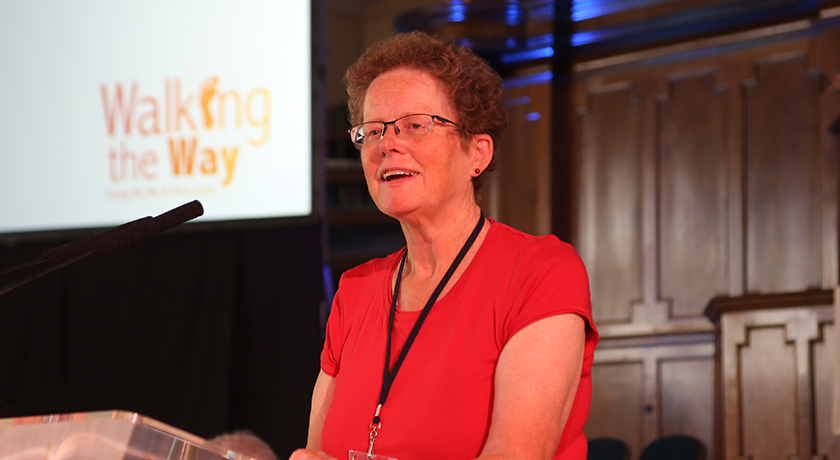 Business session four
Business session four
General Assembly Moderators elected for 2020-2022
The Revd Clare Downing and Mr Peter Pay have been elected as Moderators of General Assembly for 2020 to 2022. The result was announced on Sunday morning.
Mrs Downing was chosen as ministerial moderator. She is the Moderator of Wessex Synod, a post she has held since January 2011. Mr Pay of Salisbury United Reformed Church, was chosen as elder Moderator; he served as Clerk for Wessex Synod between 2004 and 2014.
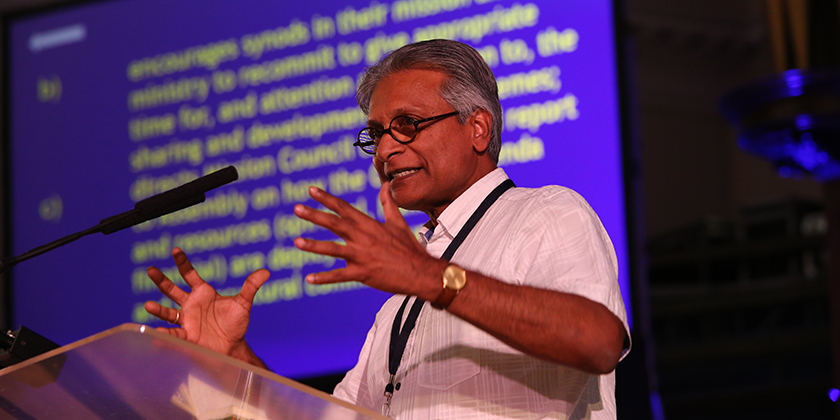 Expressing commitment to global and intercultural ministries – resolution 31
Expressing commitment to global and intercultural ministries – resolution 31
The Revd Bernie Collins, convenor of the mission committee, and the Revd Dr Michael Jagessar, Secretary for Global and Intercultural Ministries, presented the paper ‘Expressing commitment to global and intercultural ministries’ on day two of Assembly.
Their presentation spoke of the importance of the Church reaffirming its denominational commitment to the issues of justice, peace, partnerships, mutuality in giving and receiving, solidarity and discipleship, and synods finding opportunities to engage with these topics.
But when the committee tried to explore its third point – regarding reports on how the Church’s resources would be deployed to support this commitment – it became clear that its intent became lost in translation.
As Assembly were not able to pass the resolution in its original form the resolution was referred to the facilitation group. On Sunday morning, the Revd Dr Matthew Prevett spoke on behalf of the facilitation group tasked with amending resolution 31. The group had amended part c of the resolution, with new wording which ‘directs Mission Council to reflect and report to Assembly 2020 on how the Church lives out this global and intercultural commitment.’
The resolution was passed by consensus.
‘Let’s pick ourselves up and fly’: Amanda Mukwashi gives inspiring speech
Amanda Mukwashi, Christian Aid’s Chief Executive, delivered a rousing speech to General Assembly on Sunday. ‘We know exactly what needs to be done,’ Mrs Mukwashi said. ‘Let’s stand together and really show a broken world that Christianity can heal, God can heal – and that’s the message of the scriptures.’
Mrs Mukwashi began by sharing her experiences from a visit to the Cox’s Bazar refugee camp in Bangladesh: ‘There were moments I stopped and said: “You know what God – why?” But there were also moments where I saw, for example, Christian Aid volunteers with local partners trying to get water to the 90-year-old couple I met, who could not walk down the slippery steps to get water.’ Why tell these stories? asked Mrs Mukwashi. ‘It occurs to me that the world is currently broken. Broken in terms of values, broken in terms of global consensus. As Christians we have to ask ourselves: have we been put here for such a time as this?’
Christian Aid’s relationship with the URC through Commitment for Life (CfL) is a model of positive partnership, said Mrs Mukwashi. CfL, the URC's world development programme, has raised millions of pounds for Christian Aid as well as for the social justice organisation Global Justice Now. The anniversary of CfL marked ‘25 years of standing together’, she said, adding: ‘Partnership is the cornerstone of how we’re going to get to the promised land. For Christian Aid, Commitment for Life is not just a partnership, it’s that moment, that rope where, when you are feeling like it’s really tough, you know that you’re not alone.’
After answering questions from members of Assembly on corporate responsibility, the role of young people in continuing Christian Aid’s fundraising work, staff salaries and how training for door-to-door fundraisers could be improved, Mrs Mukwashi concluded the talk with a reference to her Ngoni roots: ‘I’m Zambian originally,’ she said: ‘My family comes from a clan of the eagle, and eagles’ look towards the sun. As children of God, we can fly really high. When we have God’s eyes, we can face the sun and still be OK. There is nothing – there is literally nothing that can stop us. Today’s values are shaped by Christian faith. Let’s pick ourselves up and fly.’
Mrs Mukwashi began working as Christian Aid's Chief Executive in April 2018, after serving the charity as a trustee from 2015. She is a committed Christian and a member of the Seventh Day Adventist Church. For a fuller biography, click here. Before Mrs Mukwashi’s address to Assembly, a two-minute video played, showcasing Christian Aid's work and the biblical basis for that work. To view that video, click here.
 The Assembly act of worship
The Assembly act of worship
Members of Assembly, guests, and local congregation members filled The Albert Hall, Nottingham, for Assembly’s stirring Act of Sunday Worship.
An all-age choir, made up of congregation members from around the East Midlands Synod, beautifully sang hymns, such as ‘O thou, the central orb’ and ‘God speak to us in faithfulness’.
Mr Derek Estill, Moderator of the General Assembly, thanked St Andrews with Castlegate United Reformed Church for ‘understanding our request to use their premises in a friendly and open way’. This was met with a round of applause from Assembly and the minister of St Andrew’s with Castlegate presented with gifts.
Then, the Revd Nigel Uden introduced the theme of worship – Walking the Way – referring to ‘Scoop’ the digger from children’s series Bob the Builder, a £5.99 penny whistle and the A14.
‘Now those of you who know and love East Anglia know that the A14 is the best way out of it,’ he quipped. Explaining that major roadworks are going on between Cambridge and Huntingdon to widen the road and improve it, Mr Uden made a link between it and the URC. To laughter, Mr Uden said: ‘No, I’m not going to tell you the best way to get out of it.’
Mr Uden explained that the A14 is currently the site of one of the largest archaeological digs in the UK, and is where the medieval village of Houghton has been discovered. Villagers were forced to abandon it to make way for a royal forest. Along with the discovery of the village, a military base, and tens of thousands of artefacts were also found.
Amongst the artefacts, Mr Uden explained, was a penny whistle dug up by a digger.
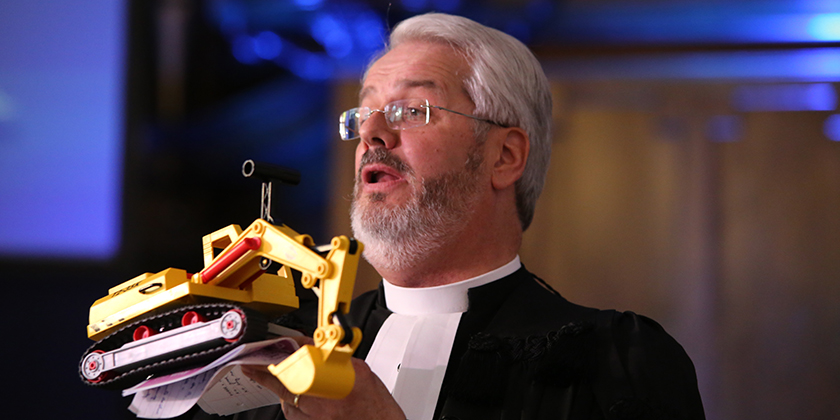 ‘What can we learn from these roadworks on the A14,’ Mr Uden asked the congregation. ‘The first point is that our history matters. Just as the rebuilding of that road is so intimately connected with history thousands of years before it, so, in the life of the URC, what we are is rooted in history. God came into history in Jesus Christ; in history God has forever displayed elements of his providence and power … God has used humanity through history as instruments of his purposes. And so, as we ponder our future of the Church, part of what matters is that we know where we came from, we know what makes us what we are; and we pray that the spirit of God gives us the discernment to understand what of that to hold onto, just as the archaeologists are discovering what needs to be preserved.’
‘What can we learn from these roadworks on the A14,’ Mr Uden asked the congregation. ‘The first point is that our history matters. Just as the rebuilding of that road is so intimately connected with history thousands of years before it, so, in the life of the URC, what we are is rooted in history. God came into history in Jesus Christ; in history God has forever displayed elements of his providence and power … God has used humanity through history as instruments of his purposes. And so, as we ponder our future of the Church, part of what matters is that we know where we came from, we know what makes us what we are; and we pray that the spirit of God gives us the discernment to understand what of that to hold onto, just as the archaeologists are discovering what needs to be preserved.’
Mr Uden explained the second point: that no matter how much history matters and despite what we can learn from it, we cannot live there. ‘The A14 demonstrates that to be effective, useful, and of value to people today,’ he continued. ‘It has had to be widened, rebuilt, and in some places completely uprooted to get to where it needs to get to more effectively. Is that not true for us?’
The Assembly sermon – John Proctor
The Assembly sermon, delivered by URC General Secretary the Revd John Proctor, was both engaging and thought-provoking. In it, Mr Proctor urged Assembly members to be open to change, and encouraged those listening to courageously step out in faith ‘into something new – a journey that frightens, but a journey that actually offers much more by way of hope.’
Churches are, he said, very good at resisting change, commenting: ‘There are two good ways to resist change in the Church. One is the jaded way, to point out: We’ve done that before. The other is the bemused way: We’ve never done that before. They work equally well. Either suffices to defuse, deter and divert any thought of innovation. …. Familiarity and fear. Fed up with what we’ve tried, fearful of what we haven’t, we stay in our groove until it becomes a grave – a grave for optimism, for hope and for courage.’
We must, he urged, be brave, moving from the temptations of keeping safe ‘in our groove’ and obsessing over every detail of Church life: ‘When I looked at the list of resolutions for General Assembly, I gave a little inward groan … I regarded with some horror the prospect of being asked, in a few days’ time, what did you do at General Assembly? and having to reply that the main thing we did was talk about the future of General Assembly. … Sorting out General Assembly is important, … [but it’s] … scarcely what we are in business for. God loves the URC, but God does not want us to be obsessed by the URC. And, if that is the main thing that absorbs us in these days, and the highlight to which we look back afterwards, Jesus may be amazed at our unbelief too, at our capacity to live in the groove.’
Mr Proctor ended his sermon reminding us that, in the end, thankfully, the Assembly has been more outlook looking that he first thought likely … and our response should be, must be, to embrace, not resist change, in full and safe knowledge that ‘when Jesus sends us, the best thing to do is to travel, in expectancy and confidence and hope.’
The full text of Mr Proctor’s sermon can be found here.
Business session five
Thousands of pounds collected for Church Action on Poverty
An offering was taken up from members of Assembly for the work of Church Action on Poverty on Sunday morning. The total raised, not counting gift aid, was £3,142.
Education and learning committee report
The convenor of the education and learning committee, the Revd Professor Neil Messer, invited Assembly to celebrate everything that had been achieved by the Training for Learning and Serving (TLS) programme and its effect on the life of the URC. TLS is winding down its activities to pave the way for Stepwise a new discipleship development programme for the URC.
The TLS programme coordinator the Revd Stanley Jackson gave thanks to the many people who made TLS work, especially the late Revd Dr David Goodbourn whose vision helped to create the programme. TLS, said Mr Jackson, ‘has transformed the lives of so many people in such extraordinary ways.’
John Parry, convenor of the management group,] thanked Mr Jackson for his service, saying: ‘You have challenged and enhanced the people’s lives, and more than that your ministry has been to the glory of God.’
Arrangements for Assembly 2020
The Revd James Breslin, convenor of the Assembly arrangements committee, introduced resolution 21 which sets the date and place of the 2020 General Assembly. The resolution was brought with an amendment, making the date of Assembly a week later. The amended resolution was passed by consensus, so the 2020 Assembly is set for 10-13 July at Aston University, Birmingham.
Mr Breslin then paid tribute to the work done by Mrs Ann Barton, secretary of the committee since 2004, who retires this year. The burden of making Assembly happen falls on her more than any other, Mr Breslin said, and Assembly applauded her contribution heartily.
The Synod Moderators’ Report
The moderators’ report has an ambitious aim – a challenge to consider how we might be called to change as we ‘walk the way’; and is offered as a resource to the whole Church –to all local churches – to help the denomination consider the purpose and necessity of all it does, and to give careful though to where it focuses its time and energies.
The synod moderators’ report – Giving up and taking up – was presented by the Revd Clare Downing and began with an entertaining short drama starring two of the synod moderators – The Revd Simon Walkling and the Revd Jacky Embry.
Following the performance, Ms Downing challenged Assembly to think about decluttering, saying: ‘Having taken up something, how about putting something down? We need to declutter … to leave behind what we don’t need … [and to take decluttering] decisions as individuals and congregations … helping each other to work out what is needed. Remember we are in a covenant relationship with each other – sharing and challenging and working out together what we really need.’
She continued, ‘in an era of anxiety, there is a tendency for us, for the churches, to look inward … yet we need to be prepared to recognise that some of what we need to let go of might have been valuable but is no longer our priority’ … Ms Downing concluded by urging Assembly to ‘Go away, be challenged by our theme – take it back to your churches and do something about it.’
Speaking from the chair, the Revd Nigel Uden, commended Assembly members to take the report back to their local churches and use it as a thought and discussion paper there. Mr Uden, describing the synod moderator role as ‘an iceberg role – we only see a part of what these 13 men and women do’, assured the synod moderators of the gratitude of Assembly for their service to the Church.
The Synod Moderators’ Report can be read in full on pages 71-76 of the Book of Reports.
The closure of churches – resolution 20
The Assembly watched a short PowerPoint commemorating the 41 United Reformed Churches or local ecumenical partnerships (LEPs) with a URC element that have closed between 1 April 2016 and 31 March 2018. Of the 41 churches, seven were LEPS that are continuing without URC involvement. The full list of closed churches can be found on pages 77 and 78 of the Book of Reports. To view the closed churches presentation, click here (this is a download link).
One speaker used the opportunity to question the strategy behind the decisions were made on closing churches, asking if there was an over-riding strategy; another speaker from the Synod of Scotland said that one of the closed churches was hers, and although very sad she was very glad indeed that the congregation had been able to close the church at the time that was right for them (and not have the decision imposed on them).
The Assembly passed with consensus resolution 20, which noted the changes and thanks to God for the work of the churches across the years.
Relations with the PCI
On Sunday afternoon, the convenor of the mission committee, the Revd Bernie Collins, made a formal statement on relations between the United Reformed Church and the Presbyterian Church in Ireland (PCI).
We believe, said Mr Collins, that since 1843 the PCI and URC had been represented at each other’s Assemblies, but the PCI has decided to stop this arrangement in response to the decision of the URC’s 2016 General Assembly on the marriage of same sex couples. Mr Collins said that the Revd Kevin Watson, as URC Assembly Moderator, had received the news with courteous regret and assured PCI members that the URC remained open to informal opportunities for contact, believing that it is important to keep communication open. The URC will continue to welcome individual PCI members to worship with us.
Comments from the floor included pressing Assembly to affirm that we stand together and are valued in the URC whatever our sexuality, saying that LGBT members must not be made to feel an embarrassment or obstacle to relationship with others. Another speaker urged that every effort be made to keep channels open and prayers for people of Ireland.
The Rt Revd Susan Brown spoke representing the Church of Scotland, with whom the PCI has also stopped exchanging Assembly representatives. She said that her Church accepts the decision of the PCI and keeps door open to them. There had been many letters, she said from people in Northern Ireland expressing hurt and disappointment at the PCI’s decision. We remember them in prayer, especially women ministers who fear they may be next.
In answer to a question about whether the URC would continue to accept PCI ministers into our ministry, the Clerk said that they would remain eligible to apply for certificates of eligibility, when these are being issued, and would be considered on the same basis as applicants from other churches, as at present.
The Moderator of General Assembly, Nigel Uden, thanked Kevin Watson for what he was able to embody at the PCI Assembly and assured General Assembly the situation would remain under careful consideration. The moderator’s chaplain, the Revd Elaine Colechin, led Assembly in prayer. The full statement can be read online here.
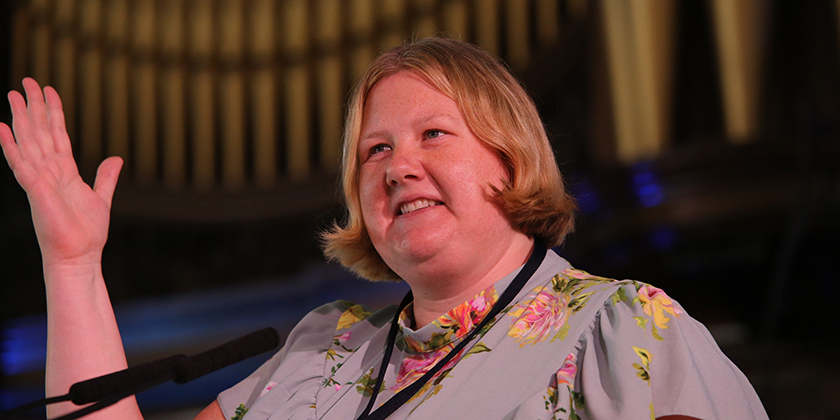 Congregational Federation: ‘Come and talk to us’
Congregational Federation: ‘Come and talk to us’
In her address to General Assembly, Yvonne Campbell, General Secretary of the Congregational Federation (CF), urged more joint working and cooperation between Congregational and United Reformed churches.
Ms Campbell shared with Assembly that the Congregational Federation today comprises some 248 churches throughout England, Scotland and Wales, with its administrative offices in Nottingham also providing student accommodation, conference space and training courses in practical theology.
Ms Campbell recalled her own association with the URC, which began 20 years ago when she started a Pilots company in her church. Later, while on a placement for her theology degree, Ms Campbell met her husband-to-be at her local URC in Liverpool, with whom she now runs a Pilots company. Ms Campbell is also the Mersey regional Pilots’ officer and expressed delight at seeing posters, displaying successful ‘good news’ stories of Pilots’ companies, including her own church, at the children’s and youth work event held as part of Assembly on Friday evening. She reported that many CF churches continue to run Pilots companies, including in Nottingham.
As CF General Secretary since 2015, Ms Campbell explained, part of her focus is to support churches in all areas of church life, from vision and mission to resources and worship – as well as promoting Congregationalism and acting as an ambassador for the denomination, especially through its representation on ecumenical bodies. Ms Campbell added that her mission was also to establish good working relationships with ecumenical bodies, saying that the United Reformed Church was a ‘natural choice’.
‘Your General Secretary, the Revd John Proctor, and I work well together and I thank John personally today,’ she said. ‘He is a great support.’
Addressing Assembly, Ms Campbell continued: ‘It is a privilege to be part of your Assembly, and to invite me to speak today. I often hear that the United Reformed Church and Congregational Federation are cousins; actually, we are brothers and sisters in Christ. I consider the United Reformed Church to be our friends, and we value that friendship immeasurably.’
Ms Campbell highlighted that the URC and CF celebrated the centenary of the ordination of Constance Coltman together last year, which she said included an ‘amazing’ conference entitled ‘Women of the way’.
The two Churches also work together through the membership of the Council for World Mission.
‘I hope that we learn, pray and serve together more with the worldwide church of Jesus Christ,’ she continued. ‘I can’t wait to get back to the offices and share the news about some of the new things that the URC is doing. I’m going to pray that God blesses you and all your work.’
En bloc business
The following en bloc resolutions were passed by simple majority, on Sunday afternoon. En bloc resolutions are voted on without debate, having been deemed uncontroversial. This has no reflection on their importance.
Resolutions 1-3: Nominations
Extensions to the appointments of the Clerk of General Assembly, the Moderator of the National Synod of Wales and the Moderator of Eastern Synod, as recommended by Mission Council.
Resolution 23: Equalities and URC Youth
This resolution brings a nominee of URC Youth onto the equalities committee.
Resolution 26: Annual accounts
A report from the URC Trust and financial statements for 2017.
Resolution 27: Active ministers
A definition of an active minister, to establish who has the responsibilities and privileges of being an active minister. The responsibilities include such things as safeguarding issues and receiving mandatory training.
Resolution 32: Nominations list
Appointments to URC committees and other assembly-appointed groups. (Noting that resolutions 40 and 41, the supplementary nominations report, was passed by consensus immediately before the en bloc business was taken.)
Moderator hosts interfaith conversation
Mr Derek Estill, Moderator of the United Reformed Church General Assembly, chaired an engaging interfaith conversation about discipleship, on Sunday (8 July). The conversation included three participants:
Rabbi Ephraim Guttentag, who leads the Hebrew congregation of St Annes-on-Sea, Lancashire, and is a Manchester University chaplain; the Revd Canon Dr Arun John, vicar of St James’ church in Blackburn and Area Dean of the Blackburn with Darwen Deanery; and Anjum Anwar, an education consultant, Muslim chaplain and the former Dialogue Development Officer of Blackburn Cathedral.
The conversation focussed on the Assembly theme, ‘Walking the Way: Living the life of Jesus today’, considering the meaning of discipleship today, in the context of the faith traditions represented.
Dr John said: ‘I don’t come from a country where Christianity has been a dominant religion. My father was a Hindu, my mother a Muslim. For me, discipleship is radical change in your life, following somebody who has really touched you in a very special way. Jesus touched a large community with his love.’
For Mrs Anwar, the word ‘disciple’ made her think of Jesus, but she added: ‘As a Muslim, a disciple has to be someone who follows a well-trodden path shown by a sheikh. Can we find God without a sheik? I’m sure we can but it’s like becoming a doctor with just a book.’
Mrs Anwar discussed her concern about the marginalisation and privatisation of faith in today’s secular world. Her comments drew enthusiastic applause from the Assembly as well as support from the other speakers. ‘My faith cannot be privatised, it has to be in the public space,’ she said. Mrs Anwar also spoke about how Christians can be too conscious of causing offence when sharing their faith or talking to people of other faiths. All speakers urged confidence in this regard.
Dr John suggested: ‘When it comes to faith conversation you have to be honest or confident. If you don’t know how to talk, learn. If you don’t know about other faiths, don’t hesitate to learn. Please don’t say to me that our [prophets] are the same – we are people of the book but our books are not the same. We need to challenge each other but also accept and celebrate our differences. That will get more respect.’
Rabbi Guttentag kept returning to the point made famous by the late Jo Cox MP: ‘We have much more in common than that which divides us.’ When asked what sentiment he wanted to leave members of Assembly with, he said: ‘Be confident in your discipleship.’
The conversation concluded with Mr Estill expressing thanks, and presenting gifts to all participants. Assembly showed its gratitude for the conversation with emphatic applause. To watch the film shown at Assembly about interfaith work, click here.
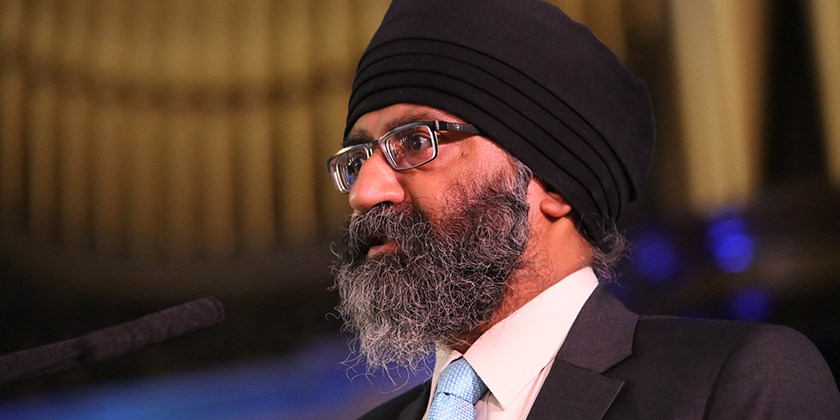 Jatinder Singh Birdi addresses Assembly on interfaith work
Jatinder Singh Birdi addresses Assembly on interfaith work
Jatinder Singh Birdi, co-chair of Inter Faith Network for the UK, addressed Assembly on Sunday afternoon, outlining the work of the national and local interfaith bodies he leads.
Inter Faith Network for the UK
Mr Birdi has been co-chair of the Inter Faith Network since October 2016. The network promotes good relations between faith communities, he said, by making their teachings and traditions better understood, towards the goal of a society where differences are respected and common ground is found. Members share good practice, and accounts of what has and hasn’t worked well. The network has nearly 200 member organisations, who shape its three-year work plan.
A highlight of the organisation’s work, Mr Birdi said, is National Interfaith Week. This annual event celebrates its tenth anniversary in November 2018. Activities, which take place across the UK, have increased each year and the use of social media is developing.
Warwick District Faiths Forum
Mr Birdi has been the Chair of Warwick District Faiths Forum since its inception in 2006. The forum brings together faith groups in the area to work with one another and with statutory bodies and voluntary organisations.
The forum’s first activity was to produce a multifaith calendar, displaying the festivals of the different religions, and this is still done every year. Another annual activity is the faiths trail, a guided tour of nearby places of worship.
The forum took part in Leamington Peace Festival, said Mr Birdi, showing a unified religious presence. It also organises a Faiths and Inclusivity Conference, which in November 2018 will focus on sustainability.
Mr Birdi concluded his address by noting that the United Reformed Church joined the Inter Faith Network in 2015. After completing its two-year provisional membership, the URC hosted the 2017 Faith Communities Forum.
The role of elders in the United Reformed Church – Resolution five
Resolution five, presented by The Revd Professor David Thompson, in his capacity as outgoing convenor of the law and polity advisory group, spoke of the of the increasing importance of elders in the life of local churches, especially those involved in multi-church pastorates. To fully recognise the role of elders in the denomination this paper proposes that, at their ordination or induction, elders make the following promise: ‘Do you promise as an elder of the United Reformed Church to seek its well-being, purity and peace, to cherish love towards all other churches and to endeavour always to build up the one, holy, catholic and apostolic Church? (The answer to which is: ‘By the grace of God I do, and all these things I profess and promise in the power of The Holy Spirit.’)
After a short discussion, much of which focused on the need for a wider debate on the role of elders including the clear need to look at behavior/disciplinary aspects of eldership, the Assembly approved the resolution by the necessary two-thirds majority. Following which the General Secretary, John Proctor, explained that, as this additional promise involved a change to the Basis of Union, it needed to be referred to synods, and local churches would be included in the referral. Synods and churches have until the end of 2019 to make their responses, the business would return to General Assembly 2020.
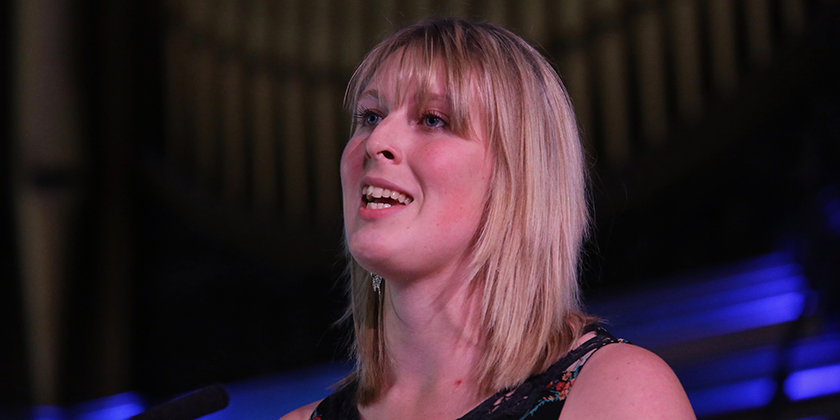 Mission Council appendix five: Report from the 20-40 task group
Mission Council appendix five: Report from the 20-40 task group
Victoria Paulding presented a report exploring how the Church could engage more with 20-40-year-olds. The report is the culmination of four years’ work, which went beyond the original age range, and considered people within the URC, from other denominations and those not engaged with churches at all.
Ms Paulding said that the findings of the report were clear: this generation was missing from the institutional church, not the church of God. The report showed that engagement involves building personal relationships with individuals and moving forward together.
‘Engaging in relationships and developing the Church that way, is a solution not only relevant to 20-40-year-olds but to every generation,’ she said. ‘And the irony is, in 10 or 20 years’ time, 20-40-year-olds will be a completely different generation and the solutions that work today, will probably not be the solutions that work then.’
The task group urged the Church to consider the questions presented by the report at every level – in local church and synod meetings, within departments and committees – and then to act upon the results.
In the discussion that followed, one member of Assembly reflected on the 41 churches that have closed since Assembly last met, saying: ‘We need to take action most urgently.’ Another drew attention to the finding of the report that a key component of effective ministry is significant leadership roles, as people with a stake in church are more likely to stay involved. This member suggested that one practical way of addressing this would be to hold meetings at more sociable times – meetings held during the day while people are at work or in college defeated this objective.
Ms Paulding acknowledged the points raised, and encouraged members to take the findings of the report back to their churches and synods. The task group were thanked for their work with a round of applause.
Assembly commends safeguarding report
The Revd Richard Church, Deputy General Secretary (Discipleship) for the United Reformed Church, presented reports from the safeguarding advisory group and the past case review team on Sunday (8 July). The reports are appendices to Mission Council’s report to General Assembly – the URC’s key decision-making body – and they deal with current safeguarding concerns and advice (appendix six) and the feedback and recommendations relating to the conclusion of phase two of the URC's past case review (appendix seven).
‘Safer recruitment to trusted roles involves a process of checking which is described in appendix six,’ explained Mr Church. ‘Appendix seven is intended to chart the journey that the URC has already travelled with regard to our past case review and to give some pointers to practice which will come for decision to Mission Council in November.’ Mr Church noted that in response to errors that had been highlighted in the grid on page 37, revisions will be made to the document before it is presented to Mission Council.
Praising the courage of those people who came forward in the second phase of the past case review, Mr Church noted that ‘without that disclosure, we would have nothing from which to learn,’ and that ‘more importantly, there would not have been an opportunity for the attentive listening [we provided] and hopefully consequently healing.’ Mr Church also introduced Ioannis Athanasiou, the URC's Safeguarding Officer, to the Assembly, heartily commending his work thus far.
A short discussion ensued about the appendices, leading Mr Church and Mr Athanasiou to respond to queries about whether fuller and more explicit provision could be made for Scottish law in relation to safeguarding (Mr Athanasiou confirmed that resources were being prepared on this), whether the report could use stronger language to compel better safeguarding practice within the Church, and whether there might be other past cases that the review had not identified.
Mr Athanasiou said: ‘We have to improve our understanding of safeguarding if we are concerned about human rights and if we really want to improve the wellbeing of each person within the Church.’ Thanking the Church for its attentive concern over this issue, Mr Athanasiou urged members of Assembly to regularly communicate with synod safeguarding officers and to actively use the resources available to assist churches in better safeguarding practice. The URC’s safeguarding team was then applauded and thanked for its work.




